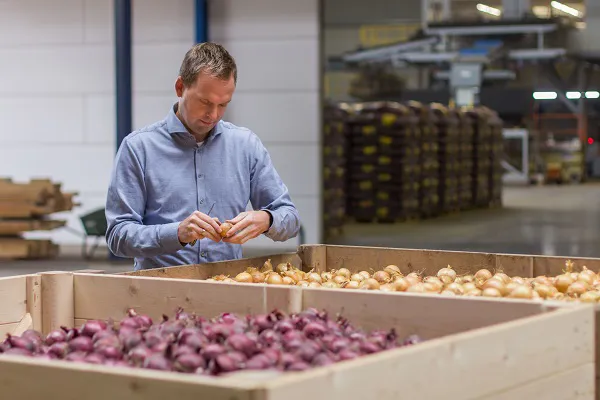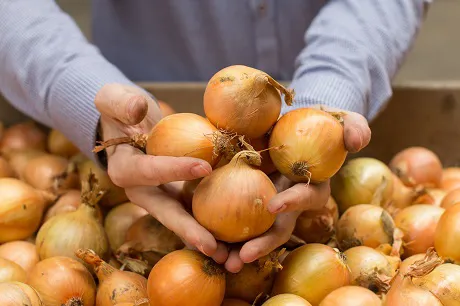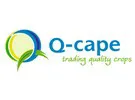From February onward, the demand for organic onions increased, as was expected by traders and packing stations. Business from Germany also picked up. The demand for this product is growing. Farmers who are switching to organic cultivation are ensuring a rising supply as well.

Leo Stoker, Q-cape
“In January, prices remained fairly even. At the start of the year, a lot of onions are sold straight off the land. Prices then usually gradually climb as onions get taken out of cold storage. As soon as the demand increases, prices will too,” says Leo Stoker of Q-cape, a wholesaler in Dronten, the Netherlands.
Ample supply
Compared to last year, when the dry weather made for a decreased supply, there are enough onions this year. Growers in the Dutch province of Flevoland did not suffer under the dry conditions as much as their German counterparts last year. Dutch organic onions, therefore, came onto the market earlier. This year, trade, from Germany, in particular, started in February.

Yellow onions, Q-cape
“Things look good this year for people who grew red onions last year,” says Leo. “German supermarkets have switched to organic onions. There was a sudden demand, while supplies were not exactly geared to it. Next year, things will be different.”
Those at the Aaldering Bio Ui packing station in the Dutch village of Biddinghuizen have also noticed this trend. Guido Aaldering says, “I have the idea that there will be enough organic onions to make the finish line. Buyers prefer Dutch or a European cultivated onion over those from Egypt. Let us, therefore, hope this continues; then, I think all the onions will sell.”

Bio-Ui
Fusarium
There are, therefore, no complaints about volumes, but the onions' quality has been better. After a dry summer, a wet period followed. These conditions cause fusarium. Guido: “Especially the onions which have laid in the rain for a long time are mostly of poorer quality,” says Guido. “Yet, I know of beautiful onions that were stored in cooling cells under perfect conditions.”
Growers who are switching
An increasing number of onion farmers are converting to organic cultivation. Accord to Leo, this does not only have to do with financial considerations. “The younger generation is striving for sustainable agriculture. That is why this is a growth market.” Guido agrees. “I hope we can play a role for some of them in selling their organic onions.”
More information:
Leo Stoker  Q-cape
Q-cape
Boudewijnlaan 19
8251 RS Dronten
+31 (0) 85 00 21 020
leostoker@qcape.nl
www.qcape.nl
Guido Aaldering
g.aaldering@bio-ui.nl
Sorting and Paking Station Aaldering Bio-ui
Wentelploeg 2
8256 SN Biddinghuizen
0321 331364
06 53398164
info@bio-ui.nl
www.bio-ui.nl
